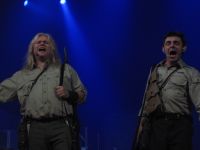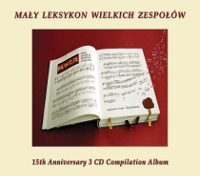 This is the concert review of the great show of Oliver Wakeman Band, Pallas and Caamora which was held at The Wyspianski Theatre in Katowice, Poland on 31st October 2007. The review was written by Artur Chachlowski (A.Ch.) and Wojtek Bieroński (W.B.). English translation: Agnieszka Muszyńska.
This is the concert review of the great show of Oliver Wakeman Band, Pallas and Caamora which was held at The Wyspianski Theatre in Katowice, Poland on 31st October 2007. The review was written by Artur Chachlowski (A.Ch.) and Wojtek Bieroński (W.B.). English translation: Agnieszka Muszyńska.
The 31st of October was a quite hapless date for the lovers of progressive rock as the event which took place that time, was followed by All Souls’ Day. Fortunately, the public turned up in large numbers and The Silesian Theatre in Katowice was full of those, who were eager to patricipate in the premiere of rock opera “She” – composed by duet “Caamora”. Performances of Oliver Wakeman Band, which started the show, and the legend of neoprogressive rock - Pallas, added the splendour to this event. It was a real feast for those who are ardent fans of progressive music. These three bands staged a concert which turned out to be a rock marathon, since it started at 5:30 p.m. and lasted nearly eight hours.
A.Ch. The son of the eminent keyboardplayer of “Yes” – Oliver Wakeman, came to play in Poland for the first time, with a view to making DVD from piece of Oliver Wakeman Band’s music. The Silesian Theatre is a well-recommended, and a perfect place for such occasions. Polish audience lived up to musician’s expectations and welcomed his rock band amicably. After the conversation with a vocalist - Paul Manzi. I’m deeply convinced that what he told me about our public greeting them so warmly as they had never experienced before, was not an empty compliment, all the more so because nothing but the mood had confirmed his words. They began in powerful and rock style starting with: “Don’t Come Running” from Oliver’s last record “Mother’s Ruin”. They played quite a lot music from their last record. As the concert proceeded, hard rock tunes gave way to ballads (“Don’t Believe In Angels”, “Mother’s Ruin”, “If You’re Leaving”) and epic songs (beautiful suite “Wall of Water” which crowned their performance). Oliver made several repertorial trips that traced back to two albums recorded jointly with Clive Nolan: “Jabberwocky” and “The Hound and The Baskervilles”. I had the impression that the hero of the evening restrained from making the balancing acts and strived not to dazzle the audience with virtuoso displays. Their work was harmonized, and cooperation of the members of the band could have been easily perceptible. As a matter of fact, they proved themselves to be a cohesive and well-organized group which has an uncanny capability to derive a true pleasure from what it does. Barely few seconds were needed for Oliver Wakeman Band to infect the more and more warmly reacting audience with it’s enthusiasm. At the end of their show, the hearts of the public were captured, and the ovations the band was given, didn’t enable it to leave the stage right away.
There was to say: “Carpe Diem”. What a pity that five delicious quarters were followed by the definite end. Especially if a true magic only just started to unfold.
After the Oliver’s performance I had an opportunity to talk to the percussionist Dave Wagstaff in the foyer of The Silesian Theatre. As it’s widely known, a musician plays in “Landmarq” as well. He informed me about the fact that Tracy Hitchings (a vocalist of the band) suffers from cancer and battles bravely against the illness. Now that she’s resolved to use a natural therapy, the positive effects are noticeable. Dave maintains that if in the summer of 2008 Tracy will be strong enough, the studio recordings can take place. Material for the new record is already completed. Personally, I would like it to happen as quickly as possible, and the reason for my being eager to hear it anon is not the only one. Be brave Tracy!
W.B. I don’t conceal that for me, the “Music” started when Pallas appeared on stage. Top class performance made emotions increase like the figures in the geometrical series. It was a splendid concert during which the Scottish band presented it’s both classical and new compositions. From the cult “Sentinal”: “Cut And Run”, “Heart Attack” and “Arrive Allive” were played. Unfortunately, they failed to regale us with the whole suite “Atlantis” however, they heartened us by playing it’s final part which sounded excellently. “The Last Angel” - the closing song from their latest record “The Dreams of Men” came out finely and movingly. If I spotted properly, it was slightly modified particularly towards the end. “Pallas” undoubtedly served us a good bit of music while presenting itself remarkably. The fact that these old troupers demonstrate a high level of ensemble which savours them with joy, could have been well seen and heard. Graeme Murray played extraordinarily well on his bass guitar, and Alan Reed did his utmost as a singer. Not even once during this breathtaking concert had I glanced at my watch, therefore I don’t have he slighest idea whether they played ninety minutes - as planned, or even longer. When it comes to my pure musical sensations, “Pallas” was a climax of the evening, although “She” was supposed to be the main course.
A.Ch. In Katowice, we witnessed a show on a grand scale that was performed with the aim of recording it on DVD. Together with double audio album it is to be premiered on the 28th of January. The forementioned publication will be dubbed into “Caamora” which represents the partnership of: Clive Nolan – Agnieszka Świta. Agnieszka, who comes from Lublin, got acquainted with Clive three years ago. They made a resolution to face with the ambitious undertaking to put on a rock opera based on a novel “She” written by Victorian author – H. Rider Haggard. Clive is responsible for texts, music and arrangement, Agnieszka then for the artistic vision of this production. It was she who played the leading figure – queen Ayesha. Świta was accompanied by: singing Clive Nolan, who was queen’s beloved Leo, Alan Reed (Pallas), cast as the traveller – Holly. Christina Booth (Magenta) played a part of an inhabitant of the lost city of Kor who unhappily falls in love with the stranger. Libretto of the rock opera is developed to such an extent that it requires the separate description which will be done when the first opportunity for this arises. Suffice it to say that the action takes place on the Central Africa's eastern coast dwelt by a mysterious Amahagger tribe. This history abounds in the twists of action and in addition to this, it has references to the events from two thousand years ago. Fire has an important role and the reason for it appering in a play repeatedly is the fact that “Caamora” itself means “cleansed by fire”. Although the theatrical scenery was colourful and worth mentioning, I would say that it couldn’t have been equated with a panache with which music illustrated the story.
W.B. Performance of “Caamora” was a close-down of the long evening in The Silesian Theatre. I would like to add that just after the presentation of rock opera, it wasn’t quite clear what to think about the show. I mean the tiredness made itself felt as early as the spectacle was in the process. I was imbued with overwhelming impression that even audience was in two minds. We have to observe strict attention when evaluating “She”. Firstly, it is to be realized that organizers ment well and felt like killing two birds with one stone (recording three concerts during one evening) but the fact is that staging the essence of the programme five hours after beginning of the whole performance might not the best possible solution. Secondly, Clive had the personal attitude towards it, which means that project of this kind must be blinked at. If it hadn’t been so, we would be justified to undermine the competence of Pendragon’s keyboardist as a singer. The malicious would point out that Clive resembled the shepherd from the Irish province – Munster, rather than an adventurer venturing deep into the Central Africa's eastern coast. Clive perceives this work as something extremely personal and there’s no wonder we didn’t see him playing the keybord but experimenting with such novelty (in his case) as singing in Katowice. As accurately emphasised by Artur, Nolan’s singing came out quite well.
To sum up, the unique character and special realities of the evening suggest to put off the robust evaluation of aesthetic qualities of this show until we watch it’s DVD version. If anyway I was inquired of how the show had come out – I would reply: not bad, maybe without exceptional stage design and eminent music, but still - material was outstandingly well played. Endowed with stage charisma and vocal abilities Agnieszka Świta deserves a credit for the fact that show met with success. The profound analysis will be done in due time. We’ll see and hear, and presumably we’ll once drop a line.
Translation: Agnieszka Muszyńska







